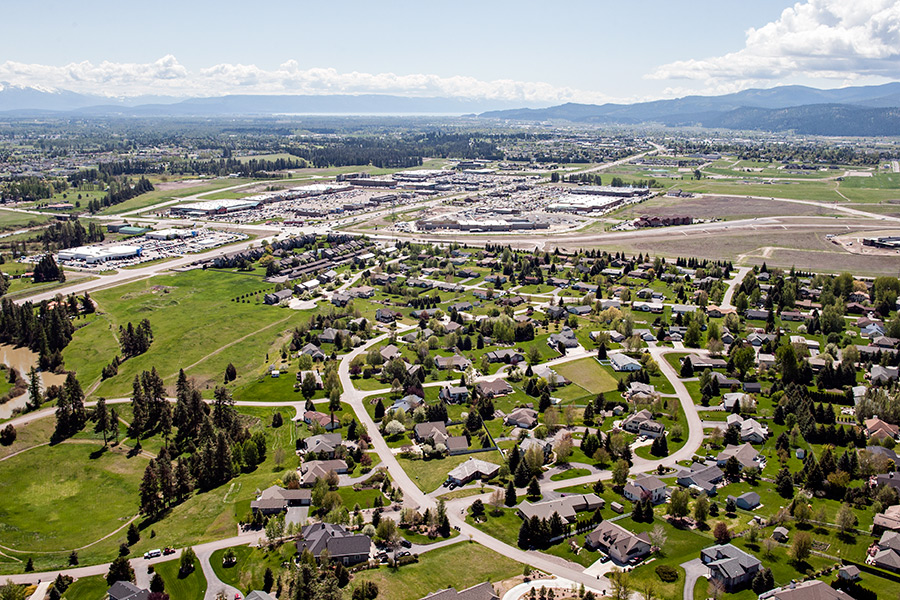In the growing tourist destination of the Flathead Valley, visitors have a long list of lodging options, including more than 325 new hotel rooms built this past year. And now, with the expansion of e-commerce, there are also hundreds of private residences — and even bedrooms — available for vacation stays.
Through online booking platforms such as VRBO and Airbnb, property owners can join the business of accommodating visitors through short-term rentals, which is forcing municipal governments to grapple with the challenges that accompany this exploding market.
According to VRBO’s online registry, there were more than 670 private lodging rentals in the Whitefish area as of late September, ranging from luxurious homes for $300 a night to a two-bedroom cabin in the woods for $191 or a condo on Big Mountain at $98.
In Columbia Falls, there were more than 300 short-term rentals, and Kalispell had nearly 40, according to research by city officials.
While VRBO lists full-sized homes for rent, the website Airbnb includes individual bedrooms that are available, and in Whitefish there were more than 300 listings, many of which offered a private room for roughly $50 to $60 a night, depending on the season.
But, according to city and county officials, many local short-term rentals are either technically illegal or breaking several rules, whether they are occurring in prohibited neighborhoods or they are not following safety and business protocols. Concerns have also been raised about the potential negative impacts to residential neighborhoods and the long-term rental market.
Kalispell and Whitefish prohibit properties from being rented for fewer than 30 consecutive days in most traditional residential neighborhoods. Properties in Flathead County are also not allowed to rent nightly stays in most areas with single-family housing.
The Kalispell City Council has held nearly a dozen meetings over the last year discussing how to handle vacation rentals amid opposition from some residents.
More than 350 residents in the Village Greens neighborhood signed a petition opposed to short-term rentals in their area. Fred Zavodny submitted the petition to the council on Sept. 12, saying the transient nature of short-term rentals creates instability in the neighborhood and hurts property values.
“Are they good or are they bad?” Kalispell Planning Director Tom Jentz said. “The council thinks they’re probably good with proper standards, but what are those standards and should they go everywhere or only in certain neighborhoods?”
In Columbia Falls, the city council crafted special provisions in 2012 when rentals began popping up in greater numbers across town. Rentals are still limited to certain commercial-residential zones, and property owners must fill out an administrative permit that outlines the rules of renting. Those include inspections by the fire marshal and health department, as well as a business license and a state public accommodation license. The application also requires a local contact who can respond to a complaint or emergency.
In Whitefish, short-term rentals can only occur in commercial and “resort” zoning districts, which includes the Railway District and some neighborhoods around Whitefish Lake. Properties eligible for vacation rentals are also required to have a short-term rental permit with emergency contact information and parking requirements, as well as a business license, which includes an annual fee ranging from $30 to $100 depending on the size of the property. Properties must also pay the town’s 3 percent resort tax and gain approval from the fire marshal.
As the number of rentals has spiked in recent years, enforcing these regulations has proven burdensome.
“We check the vacation rental websites on a regular basis,” Whitefish City Manager Chuck Stearns said. “I do enforcement for collection of resort taxes, and the Planning and Building Department does enforcement if they are operating a short-term vacation rental in a zoning district that doesn’t allow them.”
He continued, “It is a challenge because the vacation rental sites don’t list addresses and sometimes the maps aren’t exact, so we have to be able to identify properties by the pictures. It can take some time to identify them, get the property owner’s address from the County GIS website, write a letter, and then follow up with verification.”
It is unclear what percentage of short-term rentals are breaking the city ordinance, but the presence is certainly growing.
“People are building a lot of second-story condos specifically for short-term rentals,” Whitefish Planning Director Dave Taylor said. “It’s definitely a new trend in the downtown commercial district.”
One concern that reverberates in Whitefish involves affordable housing and long-term rental options.
“(Short-term rentals) do drive up housing costs, and the (month-by-month) rental market becomes more and more difficult,” Taylor said. “It’s important to protect the integrity of the traditional neighborhoods and maintain the housing stock.”
Mark Mussman, the Flathead County Planning Director, said his office received nearly a dozen calls this summer with reports of illegal short-term rentals, which are investigated and then notified if confirmed.
“There are a lot of unpermitted rentals in the county,” he said. “We’ll contact the owner and typically they say, ‘We didn’t know we can’t do this.’ And then they ask, ‘Why can’t we?’”
Mussman said he hopes the county considers revising its ordinance similar to how Columbia Falls and Whitefish are tackling the issue.
“It’s a conversation the county should have,” he said.
